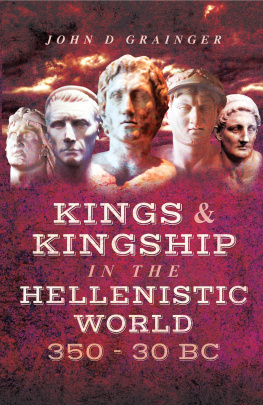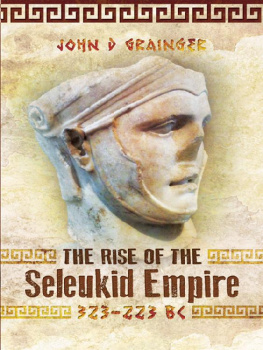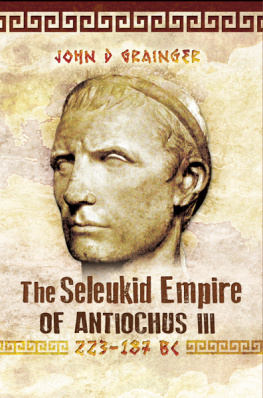John D Grainger - The Fall of the Seleukid Empire, 187-75 BC
Here you can read online John D Grainger - The Fall of the Seleukid Empire, 187-75 BC full text of the book (entire story) in english for free. Download pdf and epub, get meaning, cover and reviews about this ebook. year: 2015, publisher: Pen and Sword, genre: History. Description of the work, (preface) as well as reviews are available. Best literature library LitArk.com created for fans of good reading and offers a wide selection of genres:
Romance novel
Science fiction
Adventure
Detective
Science
History
Home and family
Prose
Art
Politics
Computer
Non-fiction
Religion
Business
Children
Humor
Choose a favorite category and find really read worthwhile books. Enjoy immersion in the world of imagination, feel the emotions of the characters or learn something new for yourself, make an fascinating discovery.

- Book:The Fall of the Seleukid Empire, 187-75 BC
- Author:
- Publisher:Pen and Sword
- Genre:
- Year:2015
- Rating:3 / 5
- Favourites:Add to favourites
- Your mark:
- 60
- 1
- 2
- 3
- 4
- 5
The Fall of the Seleukid Empire, 187-75 BC: summary, description and annotation
We offer to read an annotation, description, summary or preface (depends on what the author of the book "The Fall of the Seleukid Empire, 187-75 BC" wrote himself). If you haven't found the necessary information about the book — write in the comments, we will try to find it.
John D Grainger: author's other books
Who wrote The Fall of the Seleukid Empire, 187-75 BC? Find out the surname, the name of the author of the book and a list of all author's works by series.
The Fall of the Seleukid Empire, 187-75 BC — read online for free the complete book (whole text) full work
Below is the text of the book, divided by pages. System saving the place of the last page read, allows you to conveniently read the book "The Fall of the Seleukid Empire, 187-75 BC" online for free, without having to search again every time where you left off. Put a bookmark, and you can go to the page where you finished reading at any time.
Font size:
Interval:
Bookmark:
First published in Great Britain in 2015 by
Pen & Sword Military
an imprint of
Pen & Sword Books Ltd
47 Church Street
Barnsley
South Yorkshire
S70 2AS
Copyright John D. Grainger 2015
ISBN: 978 1 78303 030 9
PDF ISBN: 978 1 47387 420 6
EPUB ISBN: 978 1 47387 419 0
PRC ISBN: 978 1 47387 418 3
The right of John D. Grainger to be identified as the Author of this Work has been asserted by him in accordance with the Copyright, Designs and Patents Act 1988.
A CIP catalogue record for this book is available from the British Library
All rights reserved. No part of this book may be reproduced or transmitted in any form or by any means, electronic or mechanical including photocopying, recording or by any information storage and retrieval system, without permission from the Publisher in writing.
Typeset in Ehrhardt by
Mac Style Ltd, Bridlington, East Yorkshire
Printed and bound in the UK by CPI Group (UK) Ltd,
Croydon, CRO 4YY
Pen & Sword Books Ltd incorporates the imprints of Pen & Sword Archaeology, Atlas, Aviation, Battleground, Discovery, Family History, History, Maritime, Military, Naval, Politics, Railways, Select, Transport, True Crime, and Fiction, Frontline Books, Leo Cooper, Praetorian Press, Seaforth Publishing and Wharncliffe.
For a complete list of Pen & Sword titles please contact
PEN & SWORD BOOKS LIMITED
47 Church Street, Barnsley, South Yorkshire, S70 2AS, England
E-mail:
Website: www.pen-and-sword.co.uk
Contents
Maps and Tables
Maps
Table
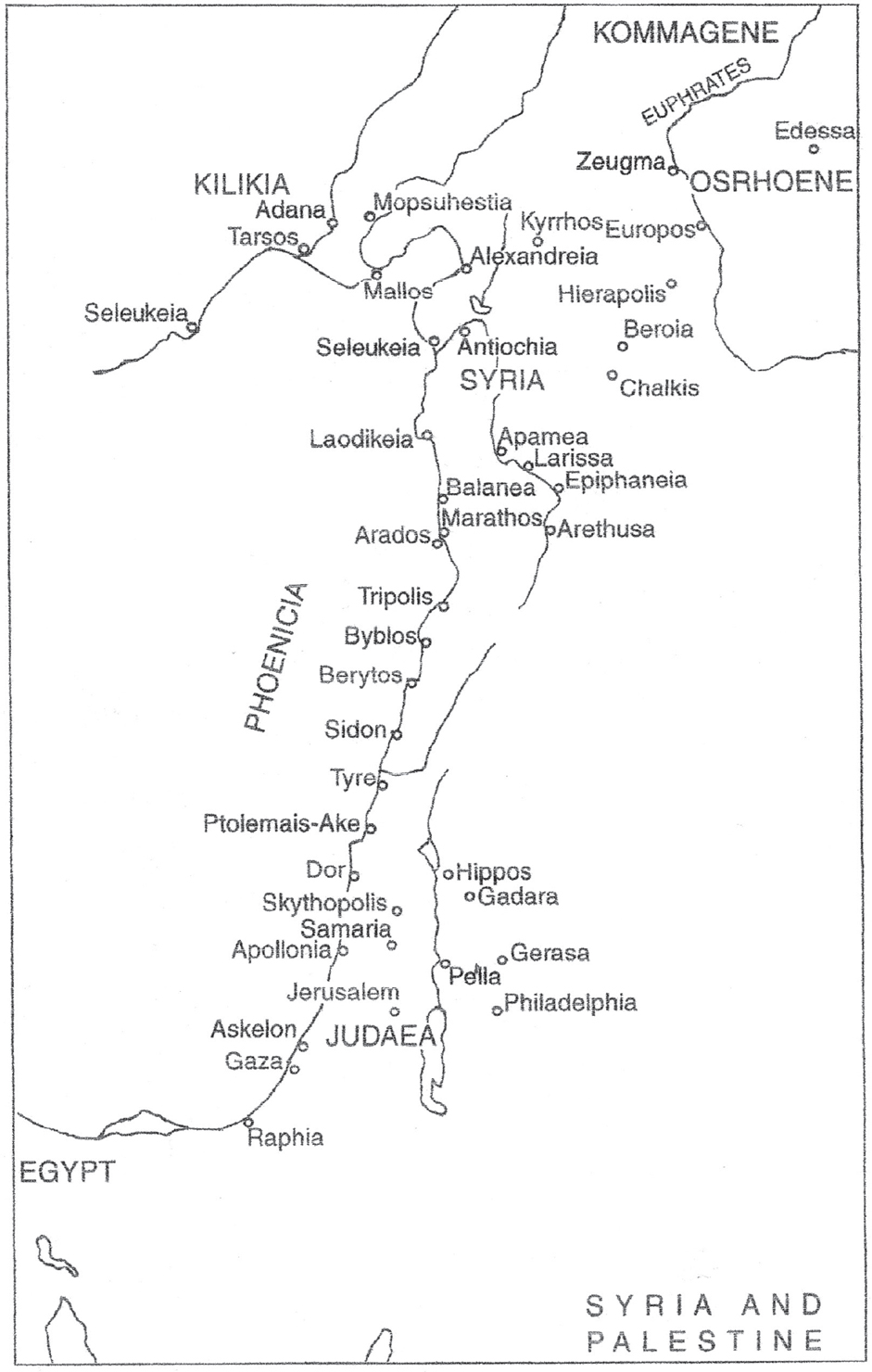
Syria and Palestine.
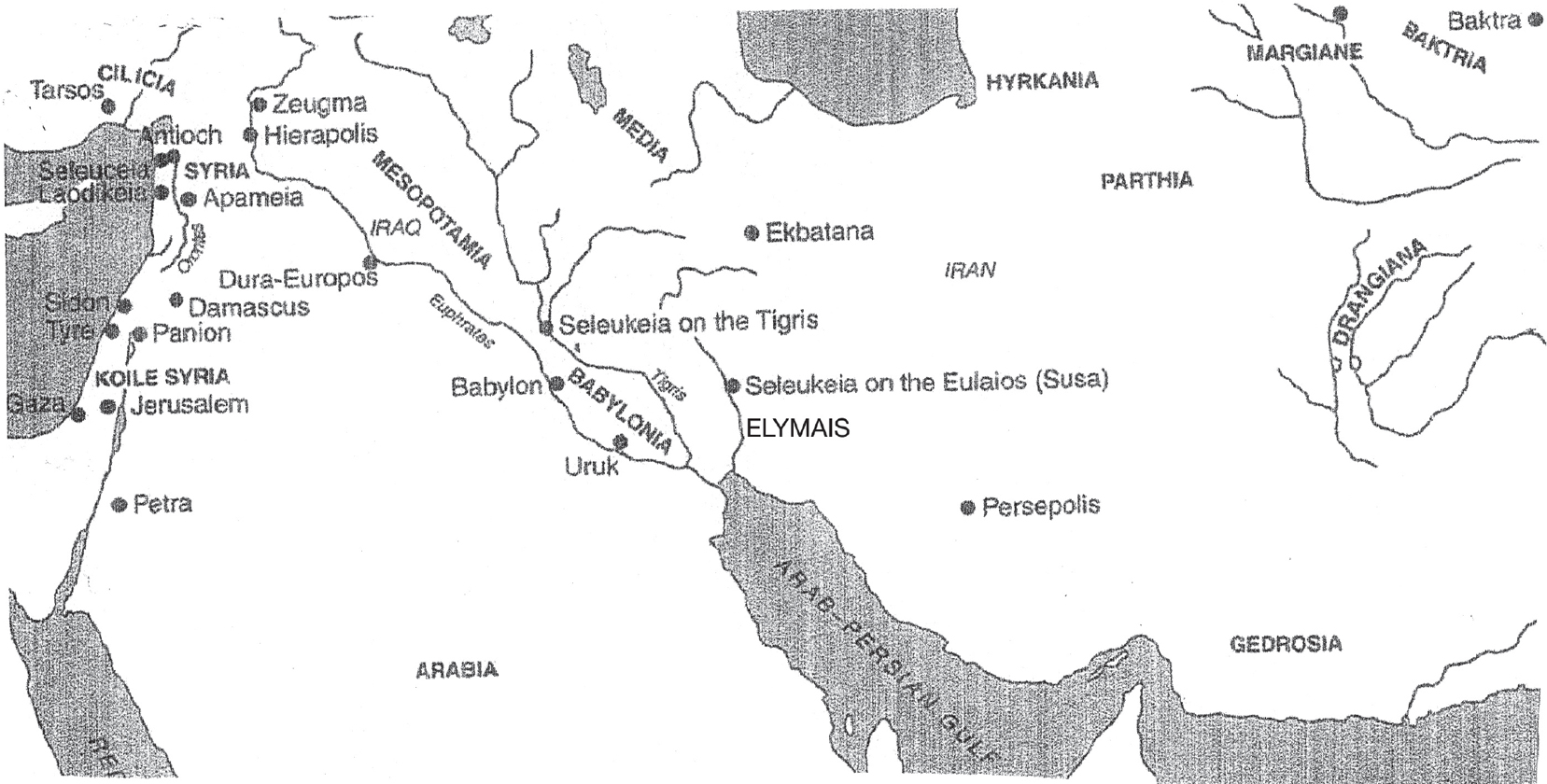
The Seleukid Regions.
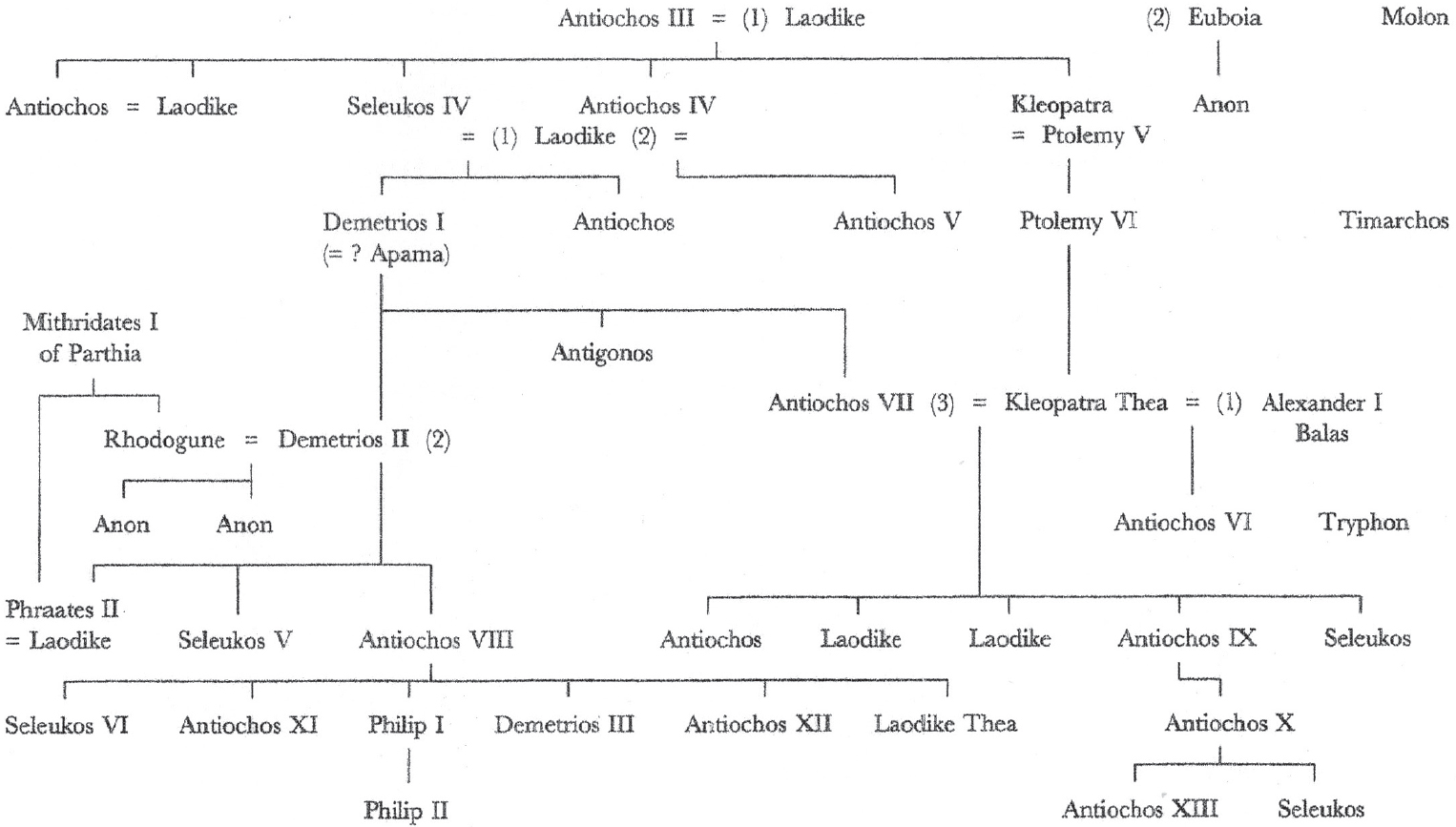
The Later Seleukid Dynasty.
Introduction
T he Seleukid kingdom was a permanent and powerful fixture on the international landscape of the Hellenistic world for a century and a half before it suffered serious political damage. Even the removal of Asia Minor in 190 and Baktria in the 250s from its control had not caused much real reduction in its power, for Asia Minor had been held only temporarily and the Baktrian area was far distant from the centre of events and had always been semi-independent. But from 150 BC onwards, as can be seen retrospectively, the kingdom was clearly in decline, though it took another generation for this to become wholly clear to contemporaries.
This decline was an event which had been devoutly wished-for by the kingdoms numerous enemies, and it is not obvious which of the many enemies or other issues may be assigned to the primary cause. The kingdom was, of course, hardly unique in being surrounded by enemies, and it certainly took those enemies a long time to destroy it. So some responsibility may be claimed by those neighbours: the Ptolemaic kingdom in Egypt, with which the Seleukid kings fought a long series of wars for two centuries; the Parthian kingdom, which nibbled away at its territories in Iran and the east; the Roman Republic, which in fact only turned up at the last minute to snatch a choice morsel; even the Armenian kingdom in the north, and the Arabs in the desert all of these had some part to play in bringing the kingdom to an end. But none of them can be said to have struck the fatal blow, unless it be Armenia and the Roman Republic, who successively seized its last territories, though only after it had been reduced to a minimal size.
A more convincing case for the kingdoms failure has been seen in its internal affairs, in particular in the civil wars which were generated by competition within the royal family, and in the rebellions and insurrections by communities aiming at some sort of independence from royal control. The problem with such explanations is that these disputes and these communities had existed from the beginning of the state, so an explanation has to be found to why these particular elements became toxic in the period after 150 BC.
Of course, no one would suppose that locating a single cause for the disappearance of a long-lived state could provide a satisfactory explanation for its demise. We are all accustomed to multiple causes of such disasters (and for many of the inhabitants of the kingdom its replacement by Roman and Parthian rule was a distinct change for the worse, certainly in the two or three generations after the conquests). It has been, however, normal to select a major cause, and so to relegate the rest to minor or contributory status. Rome has always been a favourite cause of the kingdoms destruction, and so have the civil wars. The Jews have been cast as villains or heroes, depending on ones point of view. What has not been done is to consider the matter whole, and from both the Seleukid point of view and that of its enemies.
The existing discussions of the reasons for the fall of the Seleukid kingdom are few, and, by now, old. The two main accounts of the history of the kingdom, by Bevan Yet this is hardly an adequate account of what must be seen as a major geopolitical development in world history, one which is comparable to the collapse of the Parthian power in the third century AD, and even of the fall of Rome in the fifth, or of the Arab conquests in the seventh century.
Other considerations of Seleukid history, a subject which has revived somewhat in recent years, have concentrated more on particular aspects of it, or on particular regions. So my own contribution has been on the cities of Syria, while three recent books have looked at Syrian identity, the governing elites of the kingdom, and space, territory and ideology
The several causes which have been suggested for its fall all have a degree of plausibility about them, though no single one can be assigned the dominant role. So the first thing to be done will be to consider the situation of the kingdom in the period preceding the beginning of the final Seleukid collapse, which I take to begin about 150 BC, and to have become irreversible from 129 BC. This period therefore (150129) is the crucial one. Such a consideration may indicate just what influence each had in the generation or so preceding that collapse.
There is, however, even before detailing these elements, a preliminary comment to be made, to set the Seleukid kingdoms fall in to some sort of context. The extinction of states in the Hellenistic world was by no means an unusual phenomenon. In many cases it was due to annexation by the Roman Republic, so that Roman power gradually spread south and east at the expense of such well established states as Carthage, Syracuse, Macedon, the Attalid kingdom, Bithynia, and others. The Ptolemaic kingdom had also done its part in this, by annexing the Cyrenaican and Cypriot kingdoms. So these states were by no means as well established as their age might suggest. By contrast the Seleukid state was fissiparous, shedding sections which became new states rather than absorbing them, and even in victory it tended to impose supremacy, not direct annexation. This is one aspect which also needs to be considered. That is, the Seleukid kingdom was different.
Annexation is one method of removing states, but disruption from within was much less usual. Epeiros disintegrated in 231, when, by abolishing the monarchy, its constituent communities reverted to the separated political condition they had enjoyed before the monarchic unification. Macedon, by contrast, was deliberately broken up by the Roman Republic in 167, but reunited itself twenty years later when a plausible royal pretender popped up. The Romans gave in, removed the pretender, and then annexed the kingdom as a now reunited whole and made it a province. If one is keeping score, therefore, extinction by annexation is twice as likely as internal collapse.
Next pageFont size:
Interval:
Bookmark:
Similar books «The Fall of the Seleukid Empire, 187-75 BC»
Look at similar books to The Fall of the Seleukid Empire, 187-75 BC. We have selected literature similar in name and meaning in the hope of providing readers with more options to find new, interesting, not yet read works.
Discussion, reviews of the book The Fall of the Seleukid Empire, 187-75 BC and just readers' own opinions. Leave your comments, write what you think about the work, its meaning or the main characters. Specify what exactly you liked and what you didn't like, and why you think so.








